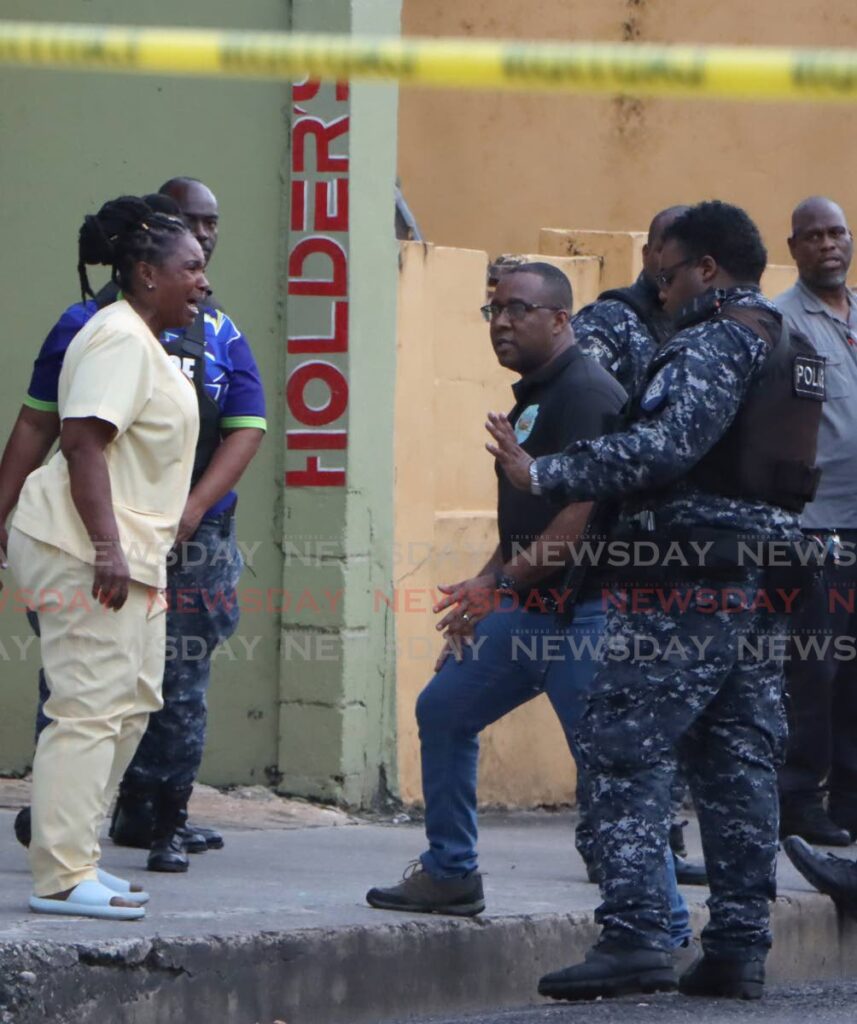Reducing murders remains biggest challenge for top cop

WHEN Erla Harewood-Christopher made history on February 3, 2023, becoming Trinidad and Tobago's first-ever female Commissioner of Police, her appointment, which received unanimous backing in Parliament, marked a milestone in the country's policing history.
Yet, as her tenure unfolds, it has been a time of both progress and challenges, with questions raised about the effectiveness of her crime-reduction strategies and her leadership during a period of rising public concern over crime.
Harewood-Christopher, who had served as acting commissioner since December 2022 before her confirmation, is no stranger to the demands of law enforcement.
In May, Cabinet approved her extension in office for a year as she turned 61, which comes to an end on May 15, 2025. Since her appointment, Harewood-Christopher has not gone on any vacation leave.
She is entitled to one-month vacation each year. The government can extend the current officeholder for an additional two years or seek to recruit a new CoP.
Starting her career in 1982 as a constable, she climbed the ranks, holding positions across various divisions, including human resources, IT and administration. The Prime Minister said she was the "highest-grade candidate" for the role.
Shortly after assuming office, Harewood-Christopher unveiled her violent crime reduction plan targeting a 20 per cent decrease in murders, a 15 per cent increase in gun seizures, and a 30 per cent improvement in crime-detection rates.
The plan also included reducing the 2022 murder toll of 605 by 121, aiming for a target of 484 murders in 2023. However, despite efforts, the end-of-year statistics for 2023 told a different story, with the murder rate decreasing by 28, ending the year at 577, making it the second-highest on record.
For this year, the murder toll has already reached 569.
The plan, a comprehensive 41-page document, outlined strategies to tackle the rising tide of violent crime. It focused on targeting repeat offenders, disrupting gang activity and improving police accountability. Increased collaboration with the US to combat gun trafficking was also emphasised, along with an effort to improve police-community relations.
Despite the high hopes placed in her plan, Harewood-Christopher was unable to meet the targets she set out. During a February meeting with Parliament's National Security Joint Select Committee (JSC), she admitted some of the targets had been "a bit exaggerated," saying they were set with the intention of motivating the police force.
While she expressed frustration over the inability to meet those targets, she defended the plan’s underlying strategies, citing successes in firearm seizures and gang disruption as notable achievements.
In addition to her operational efforts, Harewood-Christopher has faced criticism for her frequent references to faith in public statements.
In March 2023, speaking at a meeting with the Greater Chaguanas Chamber of Commerce, she sparked nationwide debate when she said, "Unless we enlist the help of God, we will be working in vain."
In January, speaking at the TTPS interfaith service, she reiterated her belief that police efforts would succeed with God's guidance, drawing both support and criticism for intertwining faith with law enforcement.
In May, when Harewood-Christopher was granted a one-year extension the Police Service Commission's (PSC) survey revealed that public confidence in the police had plummeted to an all-time low of just eight per cent.
Harewood-Christopher revised her crime reduction strategy, now focusing on a more holistic approach. Her new strategy set a more modest goal of reducing homicides by ten per cent, but it also stressed dismantling criminal gangs, retrieving illegal firearms and eradicating drug blocks.
The revision also incorporated greater use of technology to enhance police operations and intelligence capabilities. She said different communities required tailored strategies and some areas might require more aggressive policing tactics.
As of December, some promising signs emerge. Despite challenges, a decline in the murder rate for the period of November was reported, with killings dropping to 33, compared to 68 in August.
According to Deputy Commissioner of Police Junior Benjamin, the recent decrease in murders represents a 28 per cent drop in the past five weeks, attributed to increased police presence, intelligence-led operations and stronger community engagement.
Benjamin expressed optimism this decline would continue through the Christmas holiday season, as additional officers were deployed to high-crime areas and shopping malls, signalling a concerted effort to ensure public safety.
The commissioner's plan also highlighted working closely with the TT Police Welfare Association.
In April, the PSC advertised the position of CoP and last month the President appointed a new commission members whose job will now be to shortlist the best candidates vying for the top cop's job.
'Most comprehensive anti-crime plan'
Head of the association, acting ASP Gideon Dickson, on December 6, told Newsday it remains committed to working with the CoP to improve the welfare of officers, the image of the organisation, and the accountability of the institution.
He said the anti-crime plan addresses all areas on paper, where focus and resources are targeted at reducing and suppressing crime and criminality, but he believes more resources need to be allocated in a timely manner. Dickson said collaboration with other stakeholders needs to be strengthened and communicated effectively.
"We are expected to play a multi-faceted role in both seeking our officers' welfare and empowering and motivating officers whilst ensuring transparency, accountability, and fairness are dispensed at all levels within the organisational structure."
Former acting commissioner of police Stephen Williams in a WhatsApp conversation with Newsday on December 6, explained the duties and responsibilities of the office. Williams said these responsibilities include leading and managing the police service effectively, as well as directly supervising DCPs and other senior officers and staff.
He said the Constitution grants the CoP full authority over all resources assigned to the police service and managing these resources effectively is implicitly outlined.
Williams said the office is tasked with implementing and carrying out government policies.
"Each year, the CoP receives performance targets from the Police Service Commission (PSC), and the CoP's performance is evaluated based on how well those targets are achieved."

Williams said a common misconception is police funding, saying the public believes the police service receives the total allocation, but in reality, the CoP only receives releases at intervals that often do not match the full allocation.
Clarifying another misconception, he said the approval of security companies and uniforms worn by security officers falls under the responsibility of the Ministry of National Security, not the commissioner.
On October 17, Harewood-Christopher ordered police to return all tactical wear by October 23. Officers were instructed to revert to the traditional grey shirts and blue pants.
This decision followed several incidents of individuals committing criminal offences while wearing police uniforms or clothing resembling them. Four units: the Guard and Emergency Branch, the Inter-Agency Task Force, the National Operating Task Force, and the Multi-Operational Police Section, were exempt from this order.
Asked to comment on Harewood-Christopher's performance, Williams refrained saying he was not aware of her specific performance targets set by the PSC, nor does he know which targets have been achieved or failed. He said commenting would be unfair to her.
Regarding Harewood-Christopher's anti-crime reduction plan, he called it "the most comprehensive plan of its kind published by the TTPS in the last 45 years." However, he said its main weakness lies in its implementation. He believes if it is implemented effectively, the police will meet its targets.
"I have heard statements from the DCP Operations (Junior Benjamin) indicating a focus on the plan’s implementation. I look forward to seeing positive results from this focus."
In conclusion, Williams expressed optimism about the future of policing, citing nearly all senior positions in the service are now filled by officers "who can serve for extended periods, potentially up to 15 more years." He believes with engaged leadership, the future of policing is promising.
A senior officer with knowledge of the operations and workings of the commissioner's office spoke with Newsday via phone on December 5. The officer said Harewood-Christopher's anti-crime reduction targets are aligned with her job specifications and the mandates she is given. Harewood-Christopher alluded to this during her responses to questions at the JSC.
Griffith: CoP's role beyond crime reduction
Former commissioner Gary Griffith emphasised the role of commissioner, saying it extends beyond crime reduction, highlighting the need for strong leadership, motivation of staff, and the management of resources to inspire public confidence in the police.
Griffith, reflecting on the scope of the job, said the commissioner must oversee a budget of around $3 billion and manage 7,000 personnel, 120 buildings, and 1,700 police vehicles. Additionally, he said the use of technology and efficient resource allocation are critical in modern policing.
Griffith said the public’s perception of a commissioner’s performance is often shaped by three key factors: crime reduction, feelings of safety and trust in the police service. He said even if crime rates fall, he warned, a lack of public confidence or safety undermines the success of a commissioner’s leadership.
Criticising the current selection process, Griffith expressed concern over Harewood-Christopher appointment. He said despite evaluations from international experts from Penn State and KPMG, Harewood-Christopher did not perform well in the selection process.
"Her performance in areas like media interviews, tactical operations and strategic thinking was rated poorly, which has been reflected in the diminished trust and confidence in the police."
Griffith said public trust in the police has fallen from 59 per cent three years ago to below ten per cent today. He said the drop is not solely attributed to officers, but rather to a failure in leadership.
He argued the current selection process is ineffective while stressing the importance of selecting police commissioners with expertise in law enforcement leadership.
Griffith said the dismantling of successful systems and specialised units has severely impacted law enforcement efficiency. He claims the abandonment of technologies used to track police vehicles and measure performance, as well as the disbandment of units dedicated to combating violent crimes such as kidnapping and extortion, have significantly hindered the ability of law enforcement to effectively address crime.
Griffith concluded by stressing that modern policing requires tactical knowledge, particularly in dealing with sophisticated criminal elements.
"Without strong leadership capable of understanding these complexities, Griffith argued, the police force cannot effectively combat crime or restore public trust."

Comments
"Reducing murders remains biggest challenge for top cop"